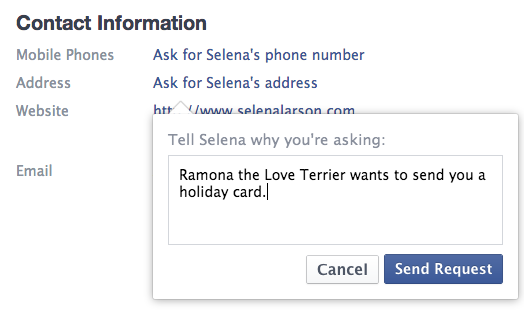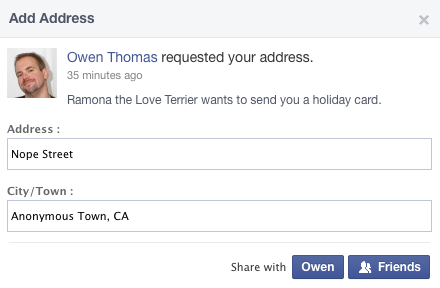
Facebook would always rather you share more, not less, on the social network. Its latest tweak now puts your friends to work to cajole you to part with personal information you may not have wanted to put out there.
Users who have not disclosed their phone numbers, home addresses or personal emails on their Facebook profiles will start getting notifications from friends who want to know more.
In 2010, Facebook CEO Mark Zuckerberg said, “People have really gotten comfortable not only sharing more information and different kinds, but more openly and with more people.”
He added, “We view it as our role in the system to constantly be innovating and be updating what our system is to reflect what the current social norms are.”
This latest change, however, seems more like an attempt to alter users’ behavior than to cater to it.
Share And Share Alike
Previously, any information that wasn’t shared on a person’s profile simply wasn’t listed. The prompt to share is new, Facebook confirmed to ReadWrite, a change that’s been slowly rolling out since late last year but “ramping up” recently.
“This feature provides an easy way for friends to ask you for information that’s not already in your profile,” a Facebook spokesperson told ReadWrite in an email. “For example, a friend could ask you where you work, or for your email address.”
When you get the request, you’ll get a prompt to share the information with the friend who requested it—or add it to your profile for all your friends to see.
It’s long been possible to adjust your settings to show your personal contact details to the public, friends, or no one, but those involve complicated privacy settings that most users avoid.
ReadWrite editor-in-chief Owen Thomas first encountered the new setting when he was looking for a friend’s email. What he saw was a link on her profile that said “Ask for [friend’s] email address.”
Curious, we then visited my profile, one that I’ve carefully crafted to show as little personal information as possible. We saw similar links, such as “Ask for Selena’s address.”

Facebook’s latest attempt to get you to share as much personal information is clever. In the past, Facebook has prompted users to fill out their work or school information—but the request came from Facebook itself, an impersonal approach that may have proven ineffective.
When Thomas asked for my address, I was prompted to fill out the location information, then choose whether to share with just him, or all my friends. While I might not mind my editor knowing where I live, the other 411 people I have as friends on Facebook—some I consider only mild acquaintances—I’d rather not know my location. And it requires only a simple inattentive click to share that with all of them. Reversing the decision requires a hunt through privacy settings.
A Very Quiet Change
The change is subtle. Facebook can argue that it’s just making it easier to ask friends for their contact information. It’s common for people to send a Facebook message asking for a friend’s email address, for example.
And Facebook is competing with a host of social startups, like Snapchat, that rely on the address books in users’ phones to match them up, vitiating Facebook’s advantage in having an authoritative list of users’ friends
As far as we can tell, with this new feature, Facebook is not changing its privacy policy or users’ settings. (Last year the company finally killed a privacy setting that kept people from searching users by their name, and people were understandably irked.) But it is introducing a function that may change people’s behavior, with unintended and risky consequences.
I received no notification letting me know friends could now request my phone number or address. The request just showed up.
Here’s why that’s a problem: To put it plainly, Facebook is using your friends to guilt you into sharing contact information on the social network.

There is no way to prevent friends from requesting your information. According to the Facebook spokesperson, only people you’re friends with can ask for your information, and they are required to say why they want it.
This feature may help cut down on messages bugging you for contact information. It might even help users who didn’t realize they could efficiently share their phone number or email address with their Facebook friends.
But Facebook should notify users that it’s coming, and create a setting that lets people opt out. That’s better than turning our profiles into one long list of fill-in-the-blanks.
















